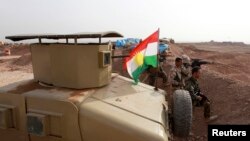The Iraqi Kurds' offensive against Islamic militants in mainly Arab areas outside their autonomous region in northern Iraq is being applauded by Western powers relieved at jihadist setbacks. But analysts worry that the advances hold serious risks of undermining U.S. strategy to coax Sunni Arab tribes to join the battle against the Islamic State.
They say the seeds of future cycles of sub-national conflicts are being sown by current hostilities and roiling of sectarian and ethnic fault lines.
Few analysts and locals believe the sectarian map across the region can be returned to how it was before the uprising against Syrian President Bashar al-Assad triggered wider fighting among religious communities. That provided the opening for al-Qaida and rival Islamic State, also known as ISIS, to exploit the violence for their own purposes.
From Iraq through Syria and on to Lebanon, sectarian divisions have been widened.
Leaders of the Kurdistan Regional Government (KRG) have reassured Arab neighbors that they have no intention of seeking to liberate the northern Iraq city of Mosul, now in the hands of the Islamic State. But the so-called disputed territories of Nineveh, Kirkuk, Salahaddin and Diyala governorates, with their significant Kurdish populations and history, are another matter. Kurds see the KRG as a reduced version of Southern Kurdistan.
Kurdish officials are already talking about eventually being able to establish a multi-confessional state going beyond the formal borders of the KRG.
They say the welcome they have received from Christian, Turkmen and Yazidi minorities show their fight back against Islamic militants, whose so-called caliphate straddles Syria and Iraq, is appreciated. Even among those minorities in the Nineveh plains, however, there are groups radicalized by what they suffered at the hands of jihadists who are now promoting the idea of their own statelet. Others remain wedded to the idea of a unified Iraq.
Local Arab tribes are even more suspicious of the Kurds. They worry the Peshmerga fighters will turn their offensive against Islamic militants into a land grab, retaking territories they have long maintained were stolen from them during the rule of Iraqi dictator Saddam Hussein. He pursued an aggressive Arabization policy involving confiscation and eviction of Kurds, Christians and Turkmen.
In a recent news conference in the Iraqi capital of Baghdad, the minister for provincial affairs, Ahmed al-Jabouri, accused Kurdish fighters of “denying the return of Arab residents in localities where IS has been expelled.”
According to Denise Natali, an analyst with the Institute for National Strategic Studies, “U.S.-led efforts to counter the Islamic State with Kurdish Peshmerga partners is having a backlash on Sunni Arab communities.”
She added that “relying on Iraqi Kurds to act as coalition boots on the ground may help eliminate some IS safe havens, but is fueling Kurdish land grabs.”
The jihadists were able to recruit local Sunni Arabs in northern and western Iraq to their cause because of widespread feelings of disenfranchisement and anger towards a Shi'ite Muslim-dominated central government in Baghdad.
The Kurdish offensive isn’t helping to assuage a deep-set sense of alienation, nor is the role being played by Iraq’s Iran-aligned Shi'ite militias, who have been accused of retaliating against Sunni Arabs and engineering their evictions from villages. In Kirkuk, the city Kurds see as their lost Jerusalem, Shi'ite militiamen have even clashed with Peshmerga fighters.
Sectarianism has riven also the opposition in Syria to President Assad.
The Sunni-dominated Western-backed Free Syrian Army brigades — as well as Islamist militias — have long fumed at the refusal of Syrian Kurds in northeast Syria to throw in their lot with them and to forgo their focus on setting up an autonomous Kurdish state of their own. Their non-aggression pact with Damascus following the withdrawal of government forces from the northeast early in the civil war prompted fury in Syrian rebel ranks.
The recent involvement of some FSA units in the defense of the Kurdish border town of Kobani has done little to build bridges between the FSA and the PYD, the dominant Kurdish party in northeast Syria.
“We don’t trust them, they have not been with us in the fight against Assad,” said an Aleppo-based FSA commander, Abdul Rahman.
Both Assad, a member of the minority Alawi offshoot of Shi'te Islam, whose members dominate the government in Damascus, and Islamic State, have purposefully set out to pit religious and ethnic groups against each other, according to Michael Weiss and Hassan Hassan, co-authors of a new book, “ISIS: Inside the Army of Terror.”
Islamic State deliberately fuels sectarianism just like the Assad regime, attacking its enemy sects to “prompt their counter-reaction [and overreaction], in order to drive Sunnis into ISIS’s protective arms,” they said.
The group then couches its fight in “sectarian-existential grammar,” they said.
That aggressive sectarianism is also spreading into Lebanon, risking re-igniting a civil war the country is still struggling to recover from.




